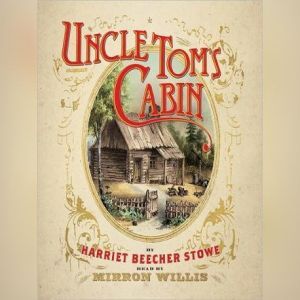

Uncle Tom's Cabin
Author: Harriet Beecher Stowe
Narrator: Mirron Willis
Unabridged: 22 hr 1 min
Format: Digital Audiobook Download
Publisher: Blackstone Audio, Inc.
Published: 12/29/2009


Author: Harriet Beecher Stowe
Narrator: Mirron Willis
Unabridged: 22 hr 1 min
Format: Digital Audiobook Download
Publisher: Blackstone Audio, Inc.
Published: 12/29/2009
Harriet Beecher Stowe was born on June 14, 1811, in Litchfield, Connecticut, to Lyman Beecher, a Calvinist preacher and activist in the antislavery movement, and Roxana Foote, a deeply religious woman who died when Stowe was four years old. Precocious and independent as a child, Stowe enrolled in the seminary run by her eldest sister, Catharine, where she received a traditionally "male" education. At the age of twenty-one, she moved to Cincinnati, Ohio, to join her father, who had become the president of Lane Theological Seminary, and in 1836, she married Calvin Ellis Stowe, a professor at the seminary and an ardent critic of slavery. The Stowes supported the Underground Railroad and housed several fugitive slaves in their home. They eventually moved to Brunswick, Maine, where Calvin taught at Bowdoin College.
In 1850, Congress passed the Fugitive Slave Law, prohibiting assistance to fugitives. Stowe was moved to present her objections on paper, and in June 1851, the first installment of Uncle Tom's Cabin appeared in the antislavery journal National Era. The forty-year-old mother of seven children sparked a national debate and, as Abraham Lincoln is said to have noted, a war.
Uncle Tom's Cabin met with mixed reviews when it appeared in book form in 1852, but it soon became an international bestseller. Some critics dismissed it as abolitionist propaganda, while others hailed it as a masterpiece. The great Russian novelist Leo Tolstoy praised Uncle Tom's Cabin as "flowing from love of God and man." Stowe presented her sources to substantiate her claims in A Key to Uncle Tom's Cabin: Presenting the Original Facts and Documents Upon Which It Is Based, published in 1853. Another antislavery novel, Dred: A Tale of the Great Dismal Swamp, appeared in 1856 but was received with neither the notoriety nor the success of Uncle Tom's Cabin.
Stowe fueled another controversy in The True Story of Lady Byron's Life, in which she accused the poet Lord Byron of having an incestuous love affair with his half sister, Lady Byron. She also took up the topic of domestic culture in works that include The New Housekeeper's Manual, written with her sister Catharine. Stowe died on July 1, 1896, at the age of eighty-five, in Hartford, Connecticut.
This book is one of the most moving, provocative pieces of literature I've ever read, and it's the first time that I can recall being moved to tears from a book. As long as I live, I will never be able to remove from my mind the vision of Eliza, panicked and frenzied, in the dead of the night with h......more
It's not really this book's fault that it sucks. Harriet Beecher Stowe's heart was in the right place: she aimed to expose the evils of slavery. Abraham Lincoln is said to have called her the “little woman who wrote the book that made this great war.” That's patronizing and it didn't, but it didn't......more
The main character of Uncle Tom's Cabin, and at least one of the minor characters, are frequently mocked by modern black activists, rappers and comedians. Therefore, when I began reading this novel, originally published in 1852, I was expecting a woefully-outdated story with painful, outrageous ster......more
Book Review 4 out of 5 stars to Uncle Tom's Cabin, written in 1852 by Harriet Beecher Stowe. For some reason, we didn't read this book in high school; possibly an excerpt or two was thrown in front of us, but I honestly don't really remember reading it until freshman year of college. Prio......more